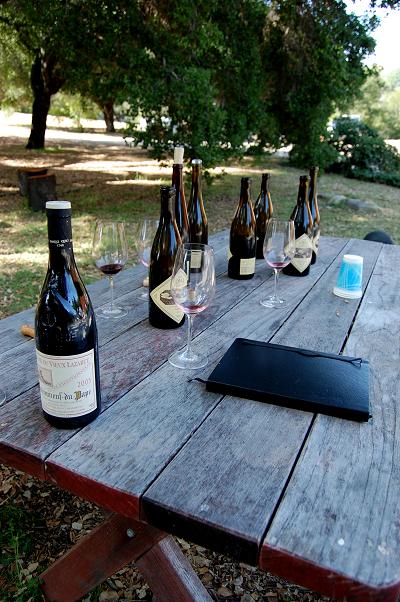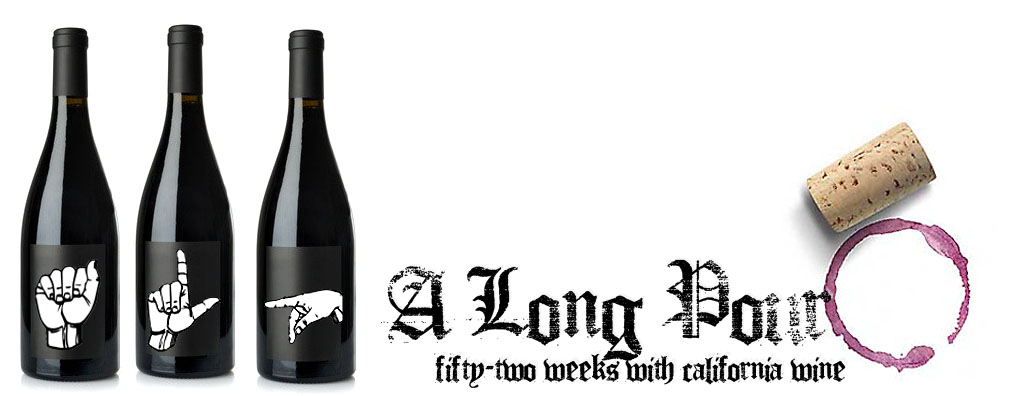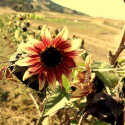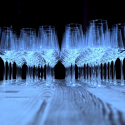The Ojai Vineyard – Myths, Rumors, and Fantastic Chardonnay
For nearly thirty years, Adam Tolmach of The Ojai Vineyard, has been making critically acclaimed wines from his humble family-owned winery on the outskirts of Ojai. He boasts a career that spans over three decades including stints at Zaca Mesa (he was the third employee), Edna Valley, a harvest in Burgundy, and ten years as a partner with Jim Clendenen at Au Bon Climat. Adam is a quiet guy with a charming sense of humor and a gentle demeanor. He enjoys being off the normal beaten path of the California wine scene. “There’s tons of gossip that goes on in the wine scene,” he tells me, “and I don’t have any interest in it at all actually.” Although Adam’s wines have earned him praise from critics and colleagues alike, as well as a devoted following over the years, he tries to avoid too much time in the limelight. “He never promotes himself,” his assistant winemaker Fabien Castel tells us.
However, there has been much debate and attention focused on Adam on forums like eRoperParker and Decanter in recent years, centered on a Los Angeles Times article entitled, “Are California Wines Over the Top?” The article included a quite fantastic quote that set the internet wine pundits a-buzz. “I’d stopped drinking my own wines,” it quoted Adam as saying. It prompted headlines on various blogs such as, “Adam Tolmach of Ojai Vineyards is in the LA Times today. It looks like Adam has gotten tired of serving the dark Sith lord Darth Parker…” The article, focused on Ojai Vineyard’s recent efforts to tame the alcohol content of some of their wines, wines that previously received very good scores from critics, such as Robert Parker.
 There was praise of Adam for standing up against the seemingly all-too-powerful Mr. Parker, as well as denunciations against him as a hypocrite. While it is wonderfully dramatic and intriguing to imagine a winemaker saying, “I have been serving the critics as lords all these years and making wines I hate to get higher scores”, there is a problem with it, according to Adam it isn’t true.
There was praise of Adam for standing up against the seemingly all-too-powerful Mr. Parker, as well as denunciations against him as a hypocrite. While it is wonderfully dramatic and intriguing to imagine a winemaker saying, “I have been serving the critics as lords all these years and making wines I hate to get higher scores”, there is a problem with it, according to Adam it isn’t true.
He has been called “Santa Barbara’s original cult winemaker.” Even other winemakers who I’ve spoken with about Adam refer to him with great admiration and respect. Yet, outside of those who personally know him, much of what I had read or heard depicted him in an almost mythical fashion. It wasn’t Adam the winemaker from Ojai, the husband, the dad, the guy with really curly hair…It was “The Legendary Adam Tolmach,” the man with the golden touch, the crusader of alcohol reduction! As with many individuals in the wine industry, writers and consumers alike have built him and others up to a William Wallace-like status, more myth than man. Are they real people, or legends that roam the hills never to be truly known, like sasquatch or the chupacabra? When I explained my theory to Adam, that many people seem to have this highly elevated view of him as almost a demigod of wine, he simply laughed and said, “good!” A little mysteriousness is good for business after all.
One of the reasons I started this project was to explore the story behind the bottle. However, what has amazed me is how few people actually take the time to talk to the people who produce the wine, rather than write a generic review that could easily be copied from a winery’s website. Everyone wants to analyze and give an opinion about a winery or winemaker. What they think is right, what they thing is wrong. Not nearly enough actually take the time to ask a question or two. A winemaker told me I had to see his land to understand his wines, and this has proved true time and time again. I thought this lack of real conversation was somewhat limited to wine bloggers, but Adam informed me that I would be surprised to know this is similar with many professional wine writers and critics. “It’s surprising how few wine writers visit…I thought that was one of the benefits of the job, you get to go visit all of these interesting places. Either we are too far off the main highway or they don’t get out as much as you think they do.” There was one other explanation he offered. “Maybe people are just afraid of me, and that’s a good thing if that’s the case,” he said with a big smile and a laugh.
I write to counteract that problem, the endless cycle of opinion and speculation. It is the end of my fourth month of a twelve-month project and I have already added more than 1,500 miles to my Mazda’s odometer in the pursuit of the story of wine, with little end in sight.
Wine can be the gateway to a great conversation, for me it often is. I strive to let the story tell itself and above all to let the words of the people behind the wine shine through. We sat with Adam for several hours at a picnic table under one of his majestic oak trees on a cool Friday afternoon, sampling many of his wines both old and new. So without my analysis of what Adam is doing right or wrong, here is what Adam told me about his thoughts on alcohol content, trends in the wine industry and his own wines.
Are American wine consumers too trend focused?
“I think there is a predilection when you taste so much wine, you are impressed by the most impressive wine. So, subtlety is lost a little bit that way. I think that has been the case to a fault. I think that’s why there’s been a reaction to these wines that are incredibly impressive, but turn out to be ultimately, at least to some people, undrinkable. It’s a matter of taste.”
“I think the other issue with that has to do with…nobody wants to be told that they have bad taste. And I think that is part of the issue. There is a whole generation of people who have followed the Parkers and Laubes of the world and their focus has been on these bigger and bigger and bigger red wines. And for someone like me, or anyone else to say, ‘um, they’re impressive, but they’re really not that good,’ it is a little bit like saying, ‘you have terrible taste’ and nobody likes to be told that. I’m not trying to tell anyone that either. It’s a big wine world.”
Adam’s assistant winemaker Fabien Castel also joined us in the tasting and conversation and he discussed some of his thoughts on trends in American wine. We spoke about a recent Wall Street Journal article about sommeliers increasingly rejecting wines above 14% alcohol. I brought it up in a negative light, that it seemed to me people were jumping on the low alcohol bandwagon all of a sudden. After all, it was not long ago everyone was all for big wines (many still are of course). Fabien offered some interesting insights into the possible reasons for the Sommelier’s championing of wines with less alcohol and more balance.
FC: “When you taste tons of wine all the time with food in mind, there is a moment where you come to the conclusion that high alcohol doesn’t really work. It just never works with food, that you really want something that is thirst-quenching. That you need to have that mouth watering effect of sufficient acidity that refreshes your mouth as you are eating the rabbit….or whatever it is. I think that’s the function of wine.”
There was a second reason Fabien, who is French and looks at wine from a dual-cultural perspective, offered as a possible reason for the somewhat fickle nature of the American wine consumer and our tendency to follow trends: we are inexperienced in comparison to some of our Old World friends. Much of this, Fabien points out, is a product of the “great interruption” of American wine culture, in the form of prohibition. Prohibition effectively put a halt to American wine culture and continued to shape the culture for decades after its end. We, as Americans, have had a relatively short period of time to build our wine culture and we are still figuring out what we like.
FC: “That is an advantage the French have. Wine is at every step of your life and you drink it as a thirst-quenching beverage. Where here, Adam has said it very often, it’s a wine of status, and it’s a wine of cocktail. Even if it is not in a tasting context, someone brings a bottle, and people are not going to drink a lot of wine, they are going to drink one or two very expensive bottles. So that bottle better be on almost the Port side so that you have a little taste and it really is incredibly impressive. It’s a different use [then in France].”
AT: “And it’s not a bad use. It’s not bad inherently. But if you like food, somehow these really monstrous wines don’t make a lot of sense.”
At this point I had my one regret in the interview. Adam started to say, “the bad thing about the article about me in The Times…”. That’s all Adam said before we got off subject with the pouring of a new wine and we never returned to his statement. I did not even realize what he had said until hours after I had left. Adam has said he was misquoted in the article, and I had intended to ask him more about that. However, without putting words into Adam’s mouth (especially after I got on my pulpit about that earlier), I think what he was getting at when he started the statement above, is that there is no single taste for everyone. Adam said several times over the course of our visit with him, “it’s not inherently bad,” when discussing various controversial aspects of winemaking. While it would be exciting for me say that Adam declared his righteous indignation against all things high alcohol content and that only a peasant’s palate could enjoy a monstrous red wine, but that was not the case. “It’s a big wine world” as he would put it, so there is room for us all.
The conversation did shift though to a controversial subject: wine critics. The premise behind some of Adam’s recent press revolves around the notion that he had been pandering to certain critics, only recently realizing the error of his ways. Others have taken his comments to suggest he is in some way on a campaign against the critics. Adam disputes this. Sometime ago, I was looking for information on him when I came across a post he left on Robert Parker’s forum (which now can only be accessed by paying members). There was a lengthy debate on eRobertParker and a similar one on Decanter a few days after the L.A. Times article was published. Many voices entered the conversation, some with positive and other negative reactions, regarding Adam’s statements. Adam posted the following on both sites, which are quoted here in part:
“I have never made wines to please wine writers. I make them for myself and my customers. I was misquoted and my statements utterly misconstrued in  The Los Angeles Times article.”
The Los Angeles Times article.”
“I have always strived for balanced wines that drink well with food. It’s embarrassing for me to say this, but I think we have a pretty good track record of making flavor-y, delicious wines that age well.”
“A few of our pinot noirs have been too big for my taste, that is to say, I don’t get great pleasure drinking them. To that end, we have been experimenting with picking less ripe grapes and are finding the results satisfying…”
“And yes, I do think these more nuanced wines will be less noticed by the critics; however, I think there are plenty of customers interested in finesse.” He concluded with some sage advice, “don’t believe everything written in the newspaper!”
Adam, who says he doesn’t like “the chatter” of forums, made only this statement and never posted on either of the threads again. I asked him if he ever saw Robert Parker’s response to his comments on eRobertParker, to which he said he had not. Mr. Parker’s response was interesting, quoted in part here:
“I have NEVER met a wine-maker who made wine intentionally to try and please some preconceived and probably incorrect notion of what I like. If I did, I would have NO respect for them, and I seriously doubt they would be capable of ever succeeding in the wine-making profession…this is such nonsense and discredits a lot of creative and independent wine producers who may be happy I admire what they do, but first and foremost, follow their own vision of quality. When I see someone obsessing about one component of a multidimensional beverage such as wine, whether it be alcohol, acidity, extract, PH, ripeness, etc., 90% of the time it is indicative of someone lost in the trees because they couldn’t see the forest. Wine-makers have one responsibility IMHO, make the best wine you can from what Mother Nature and your vineyard offers up. Make it pure, make it natural, and respect the character of the grape and vintage.”
My curiosity in Mr. Parker has grown over recent months and statements like this add to it. I am too young to have followed him for years and it wasn’t long ago I had never heard of him. However, one can’t get far into wine, without knowing who he is and what he means to the wine industry. I wonder if he really believes that he doesn’t have an impact on the wines some producers make? He has to know, right? I have had winemakers tell me incredibly negative things about him, while others have shared very positive thoughts and stories. I was curious if Adam felt Mr. Parker was unfairly singled out by those who don’t happen to share is taste. After all, the description of him at the outset of this article, that he is “the Sith lord Darth Parker”, is not exactly that uncommon of a view. At best, many feel he has too much power. At worst, some accuse him of being corrupt and tainted by his authority in wine.
Has Robert Parker been vilified?
“Oh I would say for Parker, there is no question he has been vilified. Whether he accepts it or not, he’s the most powerful wine personality on the planet…That’s a difficult position for anyone to be in. And he’s sort of just doing his thing. I think, because he is so powerful, his one palate, I mean he likes certain things a lot more than he likes other things, like everybody else. For that reason, people are mad because he doesn’t like certain things and I think that makes people angry that he is such a powerful voice in wine. You know many voices are always more interesting than just one, but he struck a cord certainly with the American taster and with people across the whole world who follow him. He came up with a simple system of how to rate wine and people seem to respond to that. Unfortunately, I think it is a little bit of a simplistic system…but I don’t think you can completely blame him for his success.”
I do not want to write a sensational article focusing on merely controversy and sound bites. Make no mistake; the real story behind Ojai Vineyard is the inmense dedication and thought that go into their incredibly well crafted and nuanced wines. I can assure you, Adam drinks his own wines and indeed takes much delight in many of them. We tasted through a span covering nearly a decade of vintages, going as far back as 99′. Each wine was a wine of character and individuality. This reflects much of what Adam stands for, that you have to be willing to change with the vintages. Whether it is a discussion of how much is too much new oak, what is the perfect sugar content, or how should the vines be pruned? Each question is met with much thought, discussion, and even experiment to test if the approach is working.
When vineyards he sources grapes from are averaging yields in the 5-7 tons an acre range, Adam’s block in the vineyard may only average 2-1/2 to 3 tons. But it isn’t enough to assume these lower yields are producing wines of greater depth and character. “We’ve taken rows right next to ours…and made that into wine and that’s in the 5-7 ton to the acre range. So, we would have separate barrels of those just to see if we were on the right track or not,” he explained. However, the results did not show that a higher yield made a terrible wine, in comparison to his lower yield vines, but it revealed something that was important to the way Adam wants to make wine. “Those wines can be pretty darn easy and attractive. And it’s like, ‘well that tastes pretty good. It’s not very intense and it’s not very Sauvignon Blanc-y’…but it can be really soft and easy. Because a higher yield means less tannins and less everything, so in some ways, a low yielding wine can be a more vexum difficult thing to understand in its youth.”
So while the higher yields don’t produce a poor quality wine, they don’t produce the wine Adam is striving for, which has more character and a better ability to age well. It costs more to produce fruit this way, but it is right for his wines. Adam carries this kind of deep thought and experimentation into other aspects of his wine making and only does what he feels improves the wine he makes. Some of his vineyard blocks are farmed organically, not because it is in vogue to do so, but because they want “to try to do all the right things” for their wine.
What struck me the most about Adam, is his fascination with his craft. He spoke about their recent experiments with various aspects of their production, as if he were still trying to figure out what winemaking is all about. “When you stop learning,” he told me, “it’s time to hammer the nails in the coffin.” In most trades, after thirty years you are on cruise control, but not him. He is still trying to find what works absolutely best for the wines he makes. The results are in the glass.
Who has inspired you in California wine?
“In California winemaking? My inspiration has been France! It’s not that I don’t drink my own wines, because I do. But, at home we tend to drink wines of the world because that’s a great way to educate your self about other wines…as a wine maker just from tasting other peoples wines you can get a pretty good inclination about how they went about making that wine. My inspiration has always been France…We have this great climate here in California…we just have it all. So the big deal is, how do you fashion that? I think that the French have, there is a sense of balance to really nice French wines. They have been making wines for years and years so you have to look at that, and see what that sense of balance is, and what that means for the wines and grab all of that and try to make the best possible wines. For me, some of the wines that are absolutely fascinating are from forward thinking people that kind of have their little Californian style almost. I am kind of looking at that melding of California and European stuff, but mostly French because I am a real fan of the Rhone north and south and Burgundy. I also started at a time when I am not really sure who you would admire in the California wine industry, in the 70’s.”
wines of the world because that’s a great way to educate your self about other wines…as a wine maker just from tasting other peoples wines you can get a pretty good inclination about how they went about making that wine. My inspiration has always been France…We have this great climate here in California…we just have it all. So the big deal is, how do you fashion that? I think that the French have, there is a sense of balance to really nice French wines. They have been making wines for years and years so you have to look at that, and see what that sense of balance is, and what that means for the wines and grab all of that and try to make the best possible wines. For me, some of the wines that are absolutely fascinating are from forward thinking people that kind of have their little Californian style almost. I am kind of looking at that melding of California and European stuff, but mostly French because I am a real fan of the Rhone north and south and Burgundy. I also started at a time when I am not really sure who you would admire in the California wine industry, in the 70’s.”
My opinions on wine have been greatly shaped by winemakers over the last few months. Adam was one of the most profound interviews I have done. While some may be convinced that only wines with intense fruit and presence are worth spending serious money on, others will go the opposite direction, seeking subtle and balanced wines that may not be a knockout of the senses. As my taste takes shape, I find great joy in a multitude of styles and feel each has its rightful place, even if I prefer some over the others. The magic of wine is its ability to fit almost any setting, sweet or dry, delicate or powerful. The funny think is after I wrote this paragraph I went to read Adam’s current newsletter and found this statement: “For me, every wine style has its place; I drink light, crisp, minerally Rieslings with lower alcohol levels in the summertime and hearty reds like Châteauneuf du Pape and Amarone in the winter. One of the great joys of wine is that it is so varied-you can always find the right match for the meal and your mood.” Looks like I learned a thing or two from him on my visit.
There is no perfect wine, just as there is no perfect human personality. If we all laughed the same way, spoke the same way, and behaved the same way, our world would be much dulled. If all winemakers were chasing the same goals, we would loose the perspective of what wine is supposed to be, an expression of a craftsman working with what nature provided him. Big wines are not inherently bad in as much as delicate wines are not inherently good. They both have a place in our big wine world and for that matter, so does Darth Parker.
(805) 649-1674



Fantastic piece of wine writing, man!!
[…] Read the original interview here: The Ojai Vineyard: “Legends, Myths, and Fantastic Chardonnay…. […]